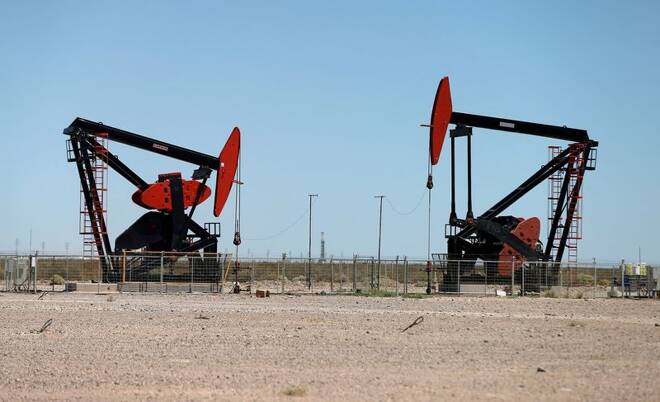Advertisement
Advertisement
Oil slumps $3/bbl on gasoline stockpiles, rate hikes and resuming supply
By:
By Stephanie Kelly (Reuters) - Oil prices fell on Thursday for a second straight session, as demand concerns outweighed tight global supply after U.S. government data showed tepid gasoline demand during the peak summer driving season.
By Laila Kearney
NEW YORK (Reuters) -Oil prices fell more than $3 a barrel on Thursday on higher U.S. gasoline stockpiles and after a European Central Bank (ECB) rate hike stoked demand worries, while returning oil supply from Libya and the resumption of Russia’s gas flows to Europe eased supply restraints.
Brent crude futures settled at $103.86 a barrel, falling $3.06, or 2.9%. U.S. West Texas Intermediate crude settled at $96.35 a barrel, declining $3.53, or 3.5%.
Both were down more than $5 earlier in the session.
U.S. gasoline futures settled at $3.15, losing 13 cents, or 3.8% following a jump of 3.5 million barrels of the commodity in storage last week, U.S. government data showed on Wednesday, far exceeding analyst forecasts. [EIA/S]
“If you don’t need the gasoline, then you don’t need the crude oil to make the gasoline, and that’s the math that’s killing crude oil right now,” said Robert Yawger, executive director of energy futures at Mizuho.
Oil futures trading volumes have also been thin and prices volatile as traders attempt to square weaker energy demand with tighter supply resulting from the loss of Russian barrels after the country’s invasion of Ukraine.
Flows through Russia’s Nord Stream 1 natural gas pipeline, which runs under the Baltic Sea to Germany, partially resumed after being shut for maintenance on July 11. The pipeline had already run on reduced volumes following a dispute sparked by Russia’s invasion of Ukraine.
“The resumption of Nord Stream gas flows appears to be conjuring up images of a more conciliatory posture on the part of Russia regarding continued movement of crude and products into Europe in the coming weeks/month,” said Jim Ritterbusch of Ritterbusch and Associates in a note.
The European Central Bank on Thursday joined many other central banks in raising interest rates, focusing on fighting runaway inflation rather than the economic downturn, which can weigh on oil demand.
The Bank of Japan maintained ultra-low interest rates to stimulate stalling economic growth.
On Wednesday, Libya’s National Oil Corp (NOC) said crude production had resumed at several oilfields after the lifting of force majeure on oil exports last week.
The reduced flow on one of Canada’s major oil export arteries, the Keystone pipeline, should only have a slight impact on oil deliveries, analysts said.
(Additional Reporting by Shadia Nasralla and Rowen Edwards in London and Florence Tan in Singapore; Editing by David Gregorio and Lisa Shumaker)
About the Author
Reuterscontributor
Reuters, the news and media division of Thomson Reuters, is the world’s largest international multimedia news provider reaching more than one billion people every day. Reuters provides trusted business, financial, national, and international news to professionals via Thomson Reuters desktops, the world's media organizations, and directly to consumers at Reuters.com and via Reuters TV. Learn more about Thomson Reuters products:
Advertisement
